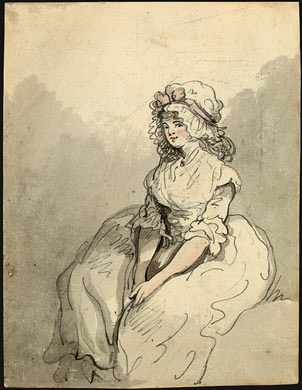
A Young English Beauty. By Thomas Rowlandson. C. 1790.
49Gossip
Decorum
|
|
|
A Young English Beauty. By Thomas Rowlandson. C. 1790. 49 |
Defined as the dignified propriety of conduct, manners, or appearance, decorum is by extension a social practice, part of the customs and observations of a polite society. John Brewer writes: "The ideal of politeness became well established during the course of the eighteenth century, and its language and values permeated every aspect of cultural life."
47 This "ideal of politeness" found its way into the public consciousness through the periodical press, particularly Richard Steele's Tatler and Joesph Addison and Steele's Spectator. As Catherine Gallagher argues, even British political discourse shifted from the Renaissance language of civic virtue towards one of civility, cultivation, and politeness. 48 Sensibility also played a tremendous role in eighteenth-century culture, centering upon a person's susceptibility to emotions of particular moral significance. Responsiveness to beauty became a crucial moral quality that was tied to questions of taste as well. Thus, through the fluid and shifting categories of decorum, politeness, sensibility, and taste, the cultivated, socially desirable person emerged. Although politeness and the like were ostensibly male virtues, females were expected to exhibit them to a degree as well. But modesty and moderation are the gendered values that both Mrs. Crackenthorpe and the Society of Ladies expect of society and urge onto their (largely female) readers.Mrs. Crackenthorpe writes: "Nothing can be so unfortunate to an agreeable young lady as want of decorum, since, as her beauty raises envy of the world, they [the people of 'the world'] pursue it by a constant prying into her conduct" (no. 28). Since women always look for faults in those prettier than themselves (and men in those wittier than themselves), any handsome female should take care to exhibit proper behavior, or she will suffer the consequences of malicious gossip.
Sophronia pokes sly fun at the pairing of beauty and behavior. She subverts those advertisements hawking cosmetics, by "advertising" virtues as the greatest enhancers of beauty. "The true, famous and approved cosmetic, being a composition of ingenuity, truth and modesty, very admirable for both sexes, and may be used constantly with great safety" (no. 89). Virtue may be an inner quality but the expression of virtue enhances outer beauty.Mrs. Crackenthorpe unvaryingly insists that behavior be ruled by one's place in society-although she suggests that any class position calls for sobriety, respectability, and industry (the last especially necessary for the lower classes). Early on, she states that rank is an absolutely necessary distinction: "But as distinction of rank is highly necessary for the economy of the world, we ought to touch upon great peoples characters with the same consideration and awful respect as we approach their persons" (no. 17). No democrat, Mrs. Crackenthorpe asserts the necessity of class distinctions in a civilized world; decorous people will maintain and perpetuate such distinctions. Those who pretend to a higher rank than is theirs by birth do not exhibit proper decorum. After all, "the pride o' the city has been always the jest o' the court": those tradesmen who have money should not flaunt themselves and affect to a class which is not theirs, eschewing connection with old acquaintances so that "those of birth and education, who are always condescending, pleasant and affable" laugh at them (no. 24). Yet this does not prevent her from later criticizing those whom she argues deserves such criticism. Mrs. Crackenthorpe was "never awed titles, airs or equipage" and, as she tells her readers, took the liberty to tell three flighty, gossipy, women-about-town "that levity and unaccountable proceedings of some great people every day renders honor less valuable in the esteem of the world, that respect now was paid to true merit, and he that has with, capacity, taste and discernment is truly noble" (no. 30). (See
Taking Airs.) With her acerbic tongue always ready to deliver scathing judgment, Mrs. Crackenthorpe spares none, especially not those females who do not act like "proper" women. Her diatribes against flighty young girls who simper and mannish females who take the same social liberties as men perhaps speaks not only to an anxiety regarding woman's portrayal of herself to society but to an anxiety regarding the blurring of traditional gender roles.The Female Tatler suggests that relations between the sexes should be equally decorous. (See
Marriage and Courtship.) Women and men should be modest. Mrs. Crackenthorpe exhorts: "As to young students, who are gay, amorous, and irresistible, I can't approve of their conversing too frequently with women, except they be women of maturity, whose strict virtue may safely admit 'em, their experience approve 'em, and their wise conduct not only discourage every inordinate attempt, but discountenance every loose expression and double entendre in discourse, which, I have taken the liberty to tell several gentlemen, is very ill manners" (no. 15). Young men should associate predominantly with older women because only they, through experience and wisdom, can prevent young men from developing amorous feelings towards women in general. Mrs. Crackenthorpe does not seem to realize that while her intentions may be good, her comment hardly flatters older women!One can display moderation in all things but virtue.
Artesia, of the Society of Ladies, observes: "Though an excess of virtue seems to imply a contradiction, yet some people are too far drawn away by good qualities that, though they are excessive, they cease not to be commendable" (no. 77). As she notes, while excessive virtue is possible, better to err on the side of virtue than on the side of immorality.
Main Page